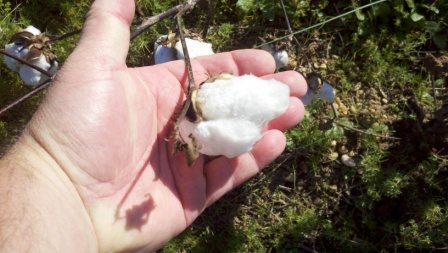We Were Hard Workers
The question I posted to Facebook yesterday–What’s the worst job you’ve ever had?—prompted several replies from friends who shared tales of their own worst job experiences. I found the responses to be quite interesting and would love to hear more. Please feel free to comment below. In the meantime, here’s “my worst job.”
Mine was when I was in high school. I think my father decided I needed this experience of hard work to help me become a man and to learn the value of a dollar. And, I think it was his way of showing me how hard he had it when he was growing up. It worked. Believe me, lesson learned and never forgotten.
I worked two summers, from sunup to sundown, pulling tobacco in the hot southern temperatures. All back-breaking and nasty hand-pulling. Individual leaves the size of small palm fronds are pulled from the stalks, starting at the bottom of the plant (note the bare stalk-bottoms in the image below). Bottom leaves ripen first.
Pulling the bottom leaves is often referred to as “the first pull,” because when you finish pulling the ENTIRE crop of lower leaves (acres upon acres of the stuff), you must start all over again a few weeks later with the second pull (don’t worry, the crops are planted in stages so that there’s always work to be done somewhere on the farm—no rest). Then the third… I’m not ashamed to say that I felt a few tears in my eyes when I faced the fields on the first morning of the second pull. Looking out over those endless rows at daybreak was an extremely daunting experience.
With each pull, the leaves are tucked into the armpit of the worker as he moves along each row from plant to plant. When the armpit bundle becomes too large to carry, the farmhand places the wad of leaves onto the slide, or trailer, and continues on. By the way, tobacco leaves are extremely waxy and sticky, and leave behind a nasty paste-like buildup of residue on your hands and wherever else the leaves touch. Workers spend a bit of time throughout the day peeling the gluey mess from their hands.
Drinking water? A metal bucket and dipper shared by all the workers. No ice. No cups
Bathroom. Nope.
The farmer I worked for used a mule named Bess and a wooden slide (no tractors) to transport the huge, sticky tobacco leaves to old wooden barns where women and children waited to tie the leaves to long sticks. I always felt sorry for Bess, having to drag that heavy load back and forth between the barns and the field, but she plodded along all day long. She also knew when to move along the rows without having to be told.
At the end of each day, after working in the hot, dusty fields, we had to carry and hang all the full, heavy tobacco sticks inside the tall unlit barns, by hand, starting at the top of the buildings (we had to climb to the peak—no ladder), working our way down to the lowest level. Sometimes we had to shove snakes out of our way, causing them to fall to the ground below where co-workers waited with the next sticks.
We headed to the fields before the sun was up, and we returned to our quarters for the evening meal after the sun was down.
I shared a room with another farmworker, a man called Cephus. No air-conditioning, two lumpy mattresses on the floor, and no screens on the windows. Nighttime temperatures hovered in the upper 80’s and mosquitoes the size of hummingbirds feasted on our blood until they could drink no more. Then they sent in the next shift of diners.
Breakfast was at 4 a.m. Eggs from resident hens, fresh sausage and smoked country ham made from a pig that used to root and oink somewhere on the farm, tomatoes and fried potatoes (both raised in the garden tended by the farmer’s wife), and homemade buttermilk biscuits and strawberry jam. Milk was freshly squeezed from either Myrtle or Maggie, the two cows who donated our liquid breakfast refreshment each morning. Coffee was for the farmer, his wife, and their kids (the farmer’s kids did not work the fields, but they were required to do other work—feed livestock, weed the gardens, etc.). Field hands ate outside, standing up, at long planks stacked on the ends of metal barrels. I was a field hand.
My pay was $3 per day. $18 per week. We were also given one ice cold Pepsi at 3 p.m. each day. I’ve been a Coke drinker since. No Pepsi for me, please.
Work was not allowed on Sunday. Time off for illness was also not allowed.
Picking cotton wasn’t as brutal, but we were paid by the sack/pound picked, not by the day. I quickly learned that it takes a whole lot of cotton to equal $3. Besides, the sharp edges of the cotton bolls were forever sticking into our fingers and kept our hands extremely sore until we developed thick callouses…another reason to choose pulling tobacco over picking cotton.
I hated every single minute of it, but I did it because the money was needed and there was a lesson that needed learning.







